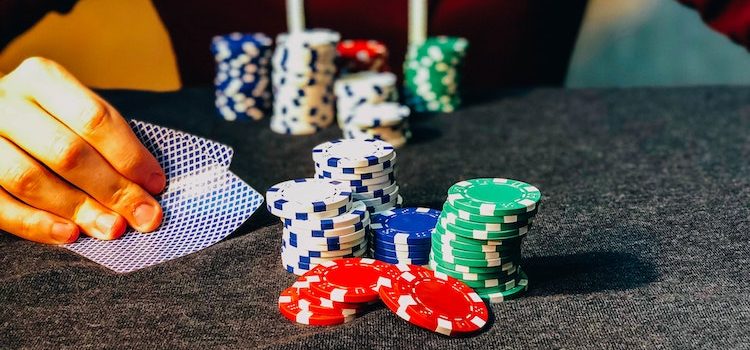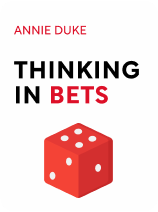

This article is an excerpt from the Shortform book guide to "Thinking in Bets" by Annie Duke. Shortform has the world's best summaries and analyses of books you should be reading.
Like this article? Sign up for a free trial here .
How is life like a poker game? What can poker teach us about dealing with uncertainty?
Life is full of unknowns. We must learn how to deal with uncertainty as we make decisions. If we consider how life is like a poker game, we can learn valuable lessons that we can apply to the decision-making process.
Read on to learn how to deal with uncertainty in life.
How to Deal With Uncertainty
As you start to break down all the factors that go into making a particular decision, you’ll probably be forced to confront the element of uncertainty. Accept that uncertainty, and use it to change the way you think about “right and wrong” in the context of decision-making.
What Game Theory Can Teach You About Decisions
Game theory is a field of study that involves using mathematical models to analyze decision-making. There’s more to it than that—it’s a complex field that examines the interaction between multiple decision-makers, taking into account chance and other factors. But we’re going to focus on the fact that scientist and mathematician John von Neumann, whom Duke names as “the father of game theory,” modeled it after poker. That’s because poker—unlike games such as chess—involves luck, hidden or incomplete information, and players who deliberately try to deceive each other. Uncertainty is part of the game.
In chess, all the information is available on the board, and the result of the game comes down to the moves that you and the other player make. Strategy, not luck. Life is a poker game, not a chess match, in that you can do everything right and lose anyway if luck is working against you. Accepting that harsh reality will help you deal with uncertainty, getting you a step closer to being able to evaluate your decisions fairly and objectively—both before and after the outcome.
Decisions Exist on a Right-to-Wrong Spectrum
Black-and-white thinking—when you view things as being either totally right or totally wrong—can sabotage your decision-making ability. Taking uncertainty into account can help you avoid that trap.
In a bet, you know that even if the odds are in your favor, there’s a chance you could lose. Betting means knowing you don’t have all the information; you have to use your best judgment in the face of risk and uncertainty.
Decisions are the same; to deal with uncertainty, you weigh the odds and hope for the best outcome. In the ideal decision-making process, you evaluate your choices and pick the option with the highest chance of success. You may also take measures to reduce the possibility of failure even if you can’t get rid of it completely.
If the less likely, unfavorable outcome is what you get, it could mean that you got unlucky, didn’t have any good choices, lacked important information, or took a risk because you thought the potential reward was worth it. It could also mean that you didn’t make the best possible choice, but you didn’t make the worst choice, either—you picked something in between for reasons that made sense to you at the time.
None of these factors means that your process was bad or your decision was “wrong.”
Just as it’s important not to immediately blame yourself for being “wrong,” it’s also good practice not to give yourself too much credit for the times when you’re right. Even if you achieved the desired outcome, you still benefit from evaluating your decision-making process. How much of your success was due to luck? Is there something you could do differently in the future to avert disasters, limit the influence of whatever isn’t in your control, and make your success more of a certainty?
Going back to an earlier example about skipping class: Even though the student didn’t miss their exam, they probably recognize that they won’t get that lucky every time they unthinkingly decide to sit out a lecture. They might think twice before skipping again, or at the very least, the near-disaster might inspire them to start keeping a calendar with all tests and other important dates marked.
How Unsure Is Too Unsure?
When you deal with uncertainty, how unsure should you be? It can be difficult to build a habit of self-evaluating a positive outcome because research shows that failure carries more weight for us than success. We feel the sting of a loss more strongly than the high of a victory. That’s why you’re better off freeing yourself from the concept of winning or losing altogether, when possible, and embracing the fact that most decisions and outcomes fall somewhere in between. And if all the choices available to you carry a degree of uncertainty, a chance of failure, you can learn to evaluate which one is the least likely to fail.
You do this mental math every time you choose between two different jobs, two different homes, two different strategies in a poker game. Each option carries the chance that something will go wrong; you pick the choice you think will turn out the best, even though you can’t be sure.
For example, maybe you choose the better-paying job out of two options. After weighing the pros and cons, you determined that being able to save up for your long-term goals was a priority. You’re aware that the hours will be longer and the responsibilities heavier, but that’s a trade-off you’re prepared for. You’re not guaranteed to succeed at the job or enjoy it. There’s a chance you’ll wind up hating the company culture and leaving in a few months, or that you’ll get fired. But you can’t know that will happen until you’ve tried. All you can do is pick the choice that you think is more likely to work out for you.
Measuring your uncertainty can make you a better decision-maker because you’ll be better at guessing the odds. By thinking about not only whether you’re unsure, but also how unsure you are, your guesses become more educated.
(Shortform note: For more strategies for dealing with uncertainty, read our guide to Fooled By Randomness.)
If you consider that life is a poker game—accepting that uncertainty is part of the game—you’ll be better equipped to make wise decisions.

———End of Preview———
Like what you just read? Read the rest of the world's best book summary and analysis of Annie Duke's "Thinking in Bets" at Shortform .
Here's what you'll find in our full Thinking in Bets summary :
- How to get better at making good decisions
- How to work around your biases
- How to evaluate and learn from your past






